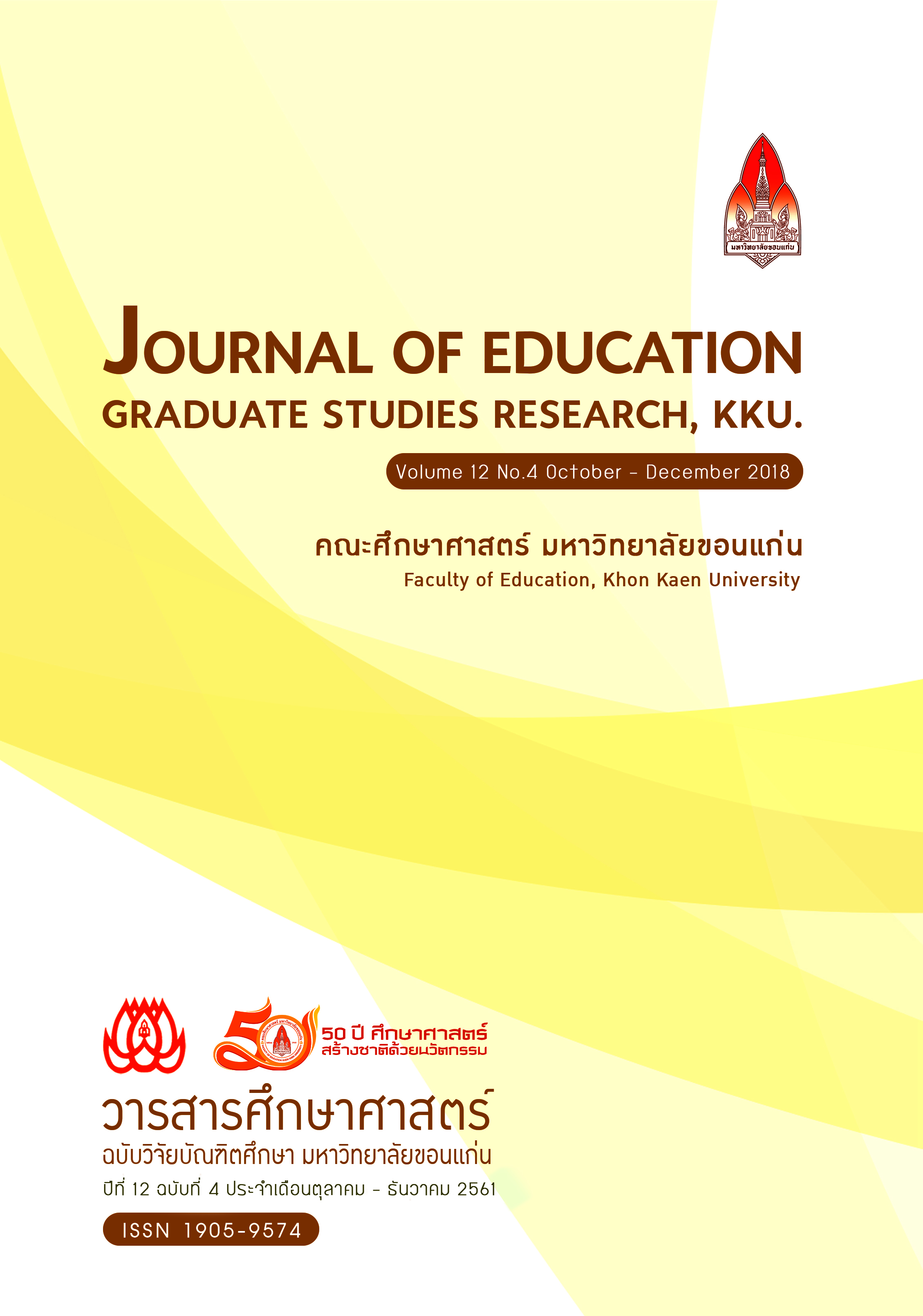Conceptual Change on Climate Change of 7 Graders Through Model-Based Inquiry (MBI)
Main Article Content
Abstract
The purpose of this research was to study students' conceptual change in Climate Change through Model-Based Inquiry (MBI). The target group was 29 students who studied in grade 7 during the second semester in 2015 at a Nongnakhamwittayakom school in Khon Kaen province, Thailand. The research methodology was pre-experimental design as a one-group pretest-posttest. The research instruments used in this study consisted of six lesson plans based on Model-Based Inquiry (MBI) and the climate change conceptual test. In this study, the climate change conceptual test was used to investigate students’ conceptual understanding of climate change before and after participating in the Model-Based Inquiry (MBI) learning activities. Data obtained from the climate change conceptual test for both pre-test and post-test were analyzed in order to differentiate the degree of conceptual understanding and to see the students' conceptual change on Climate Change. After using the Model-Based Inquiry (MBI) there were two ways of changing conception, positive shift, and negative shift. The positive shift consisted of three concepts as following: the ozone deletion, the global warming and the acid rain. The negative shift was the chemicals cause acid rain.
Article Details
References
ณัฐนิชา วราพรม. (2555). ศึกษาการเปลี่ยนแปลงมโนมติทางวิทยาศาสตร์ เรื่อง บรรยากาศ ด้วยกิจกรรมการเรียนรู้แบบทำนาย-สังเกต-อธิบาย (Predict-Observe-Explain: POE) ของนักเรียนชั้นมัธยมศึกษาปีที่ 1. วิทยานิพนธ์ปริญญาศึกษาศาสตรมหาบัณฑิต สาขาวิชาวิทยาศาสตร์ศึกษา บัณฑิตวิทยาลัย มหาวิทยาลัยขอนแก่น.
นิพนธ์ จันเลน. (2557).Inquiry กำลังจะหายไป. ค้นเมื่อ 28 เมษายน 2558,จาก http://secondsci.ipst.ac.th/index.php?option=com_content&view=article&id=457:inquirydisappear&catid=19:2009-05-04-05-01-56&Itemid=34
ไพโรจน์ เติมเตชาติพงศ์, วรรณจรีย์มังสิงห์, ทัศนีย์ บุญเติม และยาใจ พงษ์บริบูรณ์. (2550). การศึกษาการเปลี่ยนแปลงมโนมติของนักเรียนระดับชั้นมัธยมศึกษาตอนปลาย เรื่องหน้าที่ยีนโดยใช้กรอบตีความหลายมิติ. วารสารศึกษาศาสตร์มหาวิทยาลัยขอนแก่น.30(2-3), 117- 128.
วรรณจรีย์มังสิงห์. (2537). เอกสารประกอบการสอน วิชาการเรียนรู้มโนมติทางวิทยาศาสตร์. ขอนแก่น:
คณะศึกษาศาสตร์ มหาวิทยาลัยขอนแก่น. (เอกสารอัดสำเนา).
Anderson, B., and Wallin, A. (2000). Students’ understanding of the greenhouse effect, the societal
consequences of reducing CO2emission and the problem of ozone layer depletion. Journal of research in science teaching.10(37),1096-1111.
Artdej, R. et al. (2014). The role of Model-Based Inquiry to support students’ conceptual understanding. Paper presented at The Australian conference on science and mathematics education, University of Sydney, 29-30 September (pp.112-119). Sydney, ACSME.
Coştu, Ayas, Niaz, Unal, & Calik. (2007).Facilitating conceptual change in students’ understanding of the boiling concept. Journal of Science Education and Technology. 16(1), 524-536.
Chabalengula, V. M., and Mumba, F. (2012). Promoting Biological KnowledgeGeneration using Model-Based Inquiry Instruction. International Journal of Biology Education. 1(2), 1-24.
Ekborg, M. & Areskoug, M. (2006). How student teachers’ understanding of the greenhouse effect develops during a teacher education program. Nordine, 5(1),17-29.
Henriques, L. (2002). Children’s Ideas About Weather: A Review of the Literature. School Science and Mathematics, 5(May), 202-215.
Khalid, T. (2001). Pre-service teachers’ misconceptions regarding three environmental issues. Canadian Journal of environmental education. 6(1),102-120.
Neilson, D., Campell, T., &Allred, B. (2010). Model-Based Inquiry in physics: A buoyant force module. The Science Teach.77(8), 38–43.
Shepardson, D., Niyogi, D., Choi, S.& Charusombat, U. (2009). Seventh-grade students' Conceptions of global warming and climate change. Environment education research, 15(5), 549-570.
Treagust, F. D., Yoon, H.& Won, M. (2014). Students’ Learning Strategies with Multiple Representations: Explanations of the Human Breathing Mechanism. Science education.98(1), 840–866.
The institute for the promotion of teaching science and technology (IPST). (2009). The inquiry is going away. RetrievedApril 11,2017, from http://secondsci.ipst.ac.th/index.php?option=com_content&view=article&id=457:
Westbrook et al. (1990). An analysis of the relationships of formal reasoning, science process skills, gender, and instructional treatment to conceptual shift in tenth-grade biology students. Paper presented at the national association for research in science teaching conference, Atlanta, GA, 11 April.
Windchitl, M., Thomson, J., and Braaten, M. (2008). Beyond the Scientific Method: Model-Based Inquiryas a New Paradigm of Preference for SchoolScience Investigations, Science education. 92(5), 941–967.

